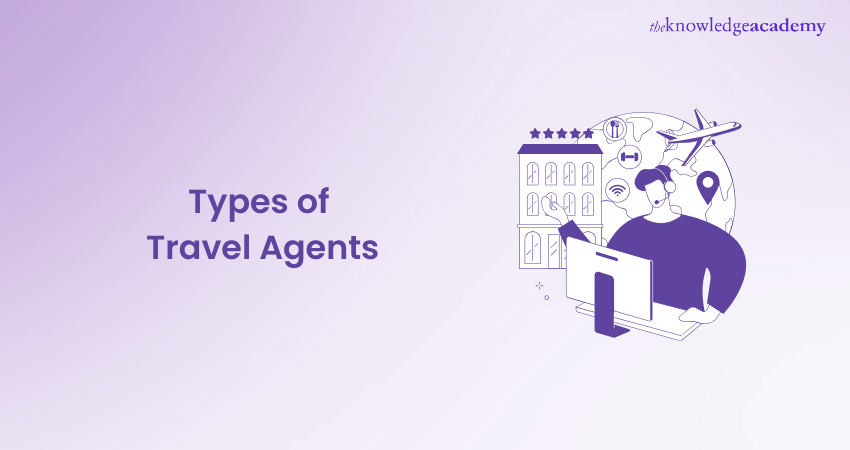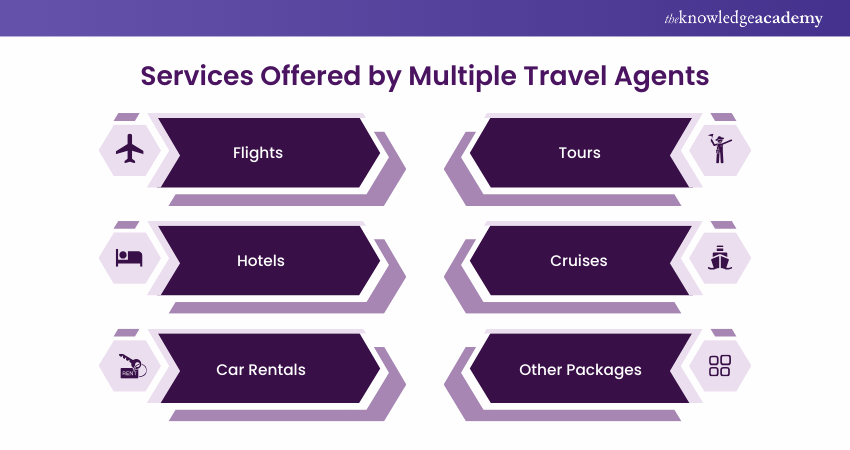We may not have the course you’re looking for. If you enquire or give us a call on 01344 203999 and speak to our training experts, we may still be able to help with your training requirements.
Training Outcomes Within Your Budget!
We ensure quality, budget-alignment, and timely delivery by our expert instructors.

Planning trips often involves facing several challenges, like finding great deals, choosing the right services, and handling complex arrangements. This is where Travel Agents step in as invaluable allies. However, the Travel industry is diverse, featuring various Types of Travel Agents.
Thus, understanding these different Types of Travel Agents can empower Travellers to make informed decisions. Moreover, it will ensure a more personalised and stress-free Travel experience that aligns perfectly with their unique needs and preferences. So, let’s delve in to learn more! In this blog, you will learn who a Travel Agent is, the different Types of Travel Agents and their roles and responsibilities in great detail.
Table of Contents
1) Who is a Travel Agent?
2) What are the Different Types of Travel Agents?
a) Independent Travel Agents
b) Online Travel Agents
c) Visitor Information Centres
d) High Street Travel Agents
e) Business Travel Agents
f) Call Centre Travel Agents
g) Multiple Travel Agents
h) Miniple Travel Agents
3) What is the Main Difference Between a Travel Agent and a Travel Operator?
4) Conclusion
Who is a Travel Agent?
A Travel Agent is an individual or a firm that arranges Travel products and services for customers. If you're interested in pursuing this profession, you may wonder how to become a Travel Agent.These Agents can work as intermediaries or organisers. An intermediary Travel Agent acts for another party, such as an airline, a hotel, or a tour operator. They then plan a journey or a stay for a customer in return for a price. They also offer many services or a series of services, including transportation, accommodation, sightseeing, and activities.
They can also provide additional services, such as visa assistance, Travel insurance, Foreign Exchange (Forex), and itinerary planning. They can operate online or offline, independently or as part of a larger network, and cater to different segments of Travellers, such as leisure, business, or special interests.
What are the Different Types of Travel Agents?
There are many Types of Travel Agents in the tourism industry, each with its own characteristics, advantages, and disadvantages. Let’s explore their different types:
1) Independent Travel Agents
Independent Travel Agents are self-employed or work for a small agency that is not affiliated with any larger network or organisation. They have more flexibility and autonomy in choosing their suppliers, products, and services. They can also offer more personalised and customised services to their customers, such as the following:
1) Tailor-made itineraries
2) Special deals
3) Niche products
Independent Travel Agents can operate online or offline and can specialise in a particular destination, market segment, or type of Travel. But such specialisations require possessing Specialised Travel Agents Skills.
However, Independent Travel Agents may also face some challenges, such as limited resources, higher costs, lower commissions, and less bargaining power with suppliers. They may also have less visibility and credibility in the market and may struggle to compete with larger and more established Travel Agents.
2) Online Travel Agents

Online Travel Agents are Agents who operate exclusively on the internet, using websites, mobile apps, or social media platforms to offer and sell Travel products and services. Online Travel Agents have many advantages, such as the following:
1) Lower overheads
2) Wider reach
3) 24/7 availability
4) More convenience
5) Choice for customers
Online Travel Agents can also use technology to enhance their services, such as online booking systems, chatbots, Artificial Intelligence (AI), and Big Data. Online Travel Agents can offer various products and services, such as flights, hotels, car rentals, tours, cruises, and packages. Some examples of online Travel Agents are Expedia, Booking.com, Skyscanner, and Airbnb. However, online Travel Agents also face some challenges, such as the following:
1) High competition
2) Low customer loyalty
3) Security and privacy issues
4) Lack of human interaction
5) Personal touch
Master the art of persuasion with our Negotiation Skills Training – Sign up now!
3) Visitor Information Centres
Visitor information centres are Travel Agencies that provide information and advice to tourists at the destination. They are usually located at airports, train stations, bus terminals, city centres, or tourist attractions.
Visitor information centres can help travellers with maps, brochures, guides, timetables, bookings, reservations, and local tips. These centres can also promote and sell local products and services, such as souvenirs, crafts, tours, events, and activities.
Some examples of visitor information centres are Visit Britain and Tourism Australia. Visitor information centres have the advantage of being close to the customers and having firsthand knowledge of the destination. However, visitor information centres may also have limited resources, staff, and products and may depend on the seasonality and popularity of the destination.
4) High Street Travel Agents
High street Travel Agents operate from physical shops or offices on the streets or shopping centres of towns and cities. High street Travel Agents can offer a range of products and services, such as the following:
1) Flights
2) Hotels
3) Car rentals
4) Tours
5) Cruises
6) Holiday packages
They can also provide face-to-face consultation, customer service, and after-sales support. Some examples of high street Travel Agents are Thomas Cook, TUI, and Flight Centre.
High street Travel Agents have the advantage of having a strong brand presence, a loyal customer base, and experienced staff. However, high street Travel Agents also face some challenges, such as high rent, overheads, staff costs, low margins and commissions, and competition from online Travel Agents and direct suppliers.
5) Business Travel Agents
Business Travel Agents specialise in arranging Travel products and services for corporate clients, such as companies, organisations, or government agencies. Business Travel Agents can offer products and services that meet the particular needs and preferences of business travellers, such as the following:
1) Flexible fares
2) Convenient schedules
3) Premium seats
4) Airport lounges
5) Meeting rooms
6) Corporate discounts
Business Travel Agents can also provide account management, reporting, invoicing, and Travel policy compliance. Some examples of business Travel Agents are American Express Global Business Travel, BCD Travel, and CWT.
These Agents have the advantage of having a stable and profitable market segment, long-term contracts, and high-value customers. However, business Travel Agents also face some challenges, such as high expectations, complex regulations, and changing Travel trends and technologies.
6) Call Centre Travel Agents
Call centre Travel Agents are professionals who operate from a centralised office or facility that handles a huge volume of phone calls from customers. Call centre Travel Agents can offer and sell travel products and services over the phone, using a computerised reservation system and a script. Call centre Travel Agents can also provide customer service, support, and assistance.
Some examples of call centre Travel Agents are Expedia, Priceline, and Travelocity. Call centre Travel Agents have the advantage of having lower costs, wider reach, and faster response than high street Travel Agents. However, they also face some challenges, such as high staff turnover, low customer satisfaction, and communication barriers.
Redefine customer interactions with our Call Center Training – sign up today!
7) Multiple Travel Agents
Multiple Travel Agents operate as part of a large chain or group that has multiple branches or outlets across different locations. They can offer a various products and services, such as the following:

They can also benefit from economies of scale, bulk buying, and brand recognition. Some examples of multiple Travel Agents are TUI, Thomas Cook, and Flight Centre. These Agents have the advantage of having a dominant market position, loyal customer base, and extensive distribution network. However, multiple Travel Agents also face some challenges, such as the following:
1) High overheads
2) Staff costs
3) Competition from Online Travel Agents and direct suppliers
8) Miniple Travel Agents
Miniple Travel Agents operate as part of a small or medium-sized chain or group that has a few branches or outlets across different locations. They can offer many products and services, such as flights, hotels, car rentals, tours, cruises, and packages. They can also provide more personalised and customised services, such as the following:
1) Niche products
2) Special deals
3) Local expertise
Some examples of miniple Travel Agents are Trailfinders, STA Travel, and Hays Travel. Miniple Travel Agents have the advantage of having a flexible and adaptable business model, a loyal customer base, and competitive prices. However, they also face some challenges, such as limited resources, bargaining power, and brand awareness.
Discover the digital tools and workflows of virtual work with our Virtual Online Job Roles Training – Register now!
What is the Main Difference Between a Travel Agent and a Travel Operator?
A Travel Agent acts as a middleman, selling travel packages, flights, and services from various providers directly to customers. A tour operator, on the other hand, creates and organises travel packages, including accommodations, transportation, and activities. Travel agents connect clients to operators, while operators design the trips.
Conclusion
We hope you read and understand the different Types of Travel Agents. The world of Travel Agents is diverse, catering to different traveller preferences and needs. From traditional brick-and-mortar agencies to online platforms and specialised niche Agents, there's a Travel Agent for everyone. Choosing the right one can enhance your Travel experience, making your journey smoother and more enjoyable.
Turn your love for travel into a successful career with our Travel Agent Training – Sign up today!
Frequently Asked Questions

The 3 main types of travel are leisure, business, and adventure. Leisure travel focuses on relaxation and enjoyment, business travel involves work-related trips like meetings or conferences, and adventure travel includes activities like hiking, diving, or exploring remote areas for thrill-seekers.

A Travel Agent primarily books and sells travel packages, acting as a middleman between clients and service providers. A Travel Advisor takes a more personalised approach, offering tailored recommendations, planning entire trips, and providing ongoing support before, during, and after the journey.

The Knowledge Academy takes global learning to new heights, offering over 30,000 online courses across 490+ locations in 220 countries. This expansive reach ensures accessibility and convenience for learners worldwide.
Alongside our diverse Online Course Catalogue, encompassing 19 major categories, we go the extra mile by providing a plethora of free educational Online Resources like News updates, Blogs, videos, webinars, and interview questions. Tailoring learning experiences further, professionals can maximise value with customisable Course Bundles of TKA.

The Knowledge Academy’s Knowledge Pass, a prepaid voucher, adds another layer of flexibility, allowing course bookings over a 12-month period. Join us on a journey where education knows no bounds.

The Knowledge Academy offers various Virtual Online Job Roles Training, including Travel Agent Training, Managing Virtual Teams Course and Online Virtual Recruitment Training. These courses cater to different skill levels, providing comprehensive insights into Graphic Design vs Visual Communication.
Our Business Skills Blogs cover a range of topics offering valuable resources, best practices, and industry insights. Whether you are a beginner or looking to advance your Software Testing skills, The Knowledge Academy's diverse courses and informative blogs have you covered.
Upcoming Business Skills Resources Batches & Dates
Date
 Travel Agent Training
Travel Agent Training
Fri 24th Jan 2025
Fri 21st Mar 2025
Fri 2nd May 2025
Fri 27th Jun 2025
Fri 3rd Oct 2025
Fri 5th Dec 2025







 Top Rated Course
Top Rated Course



 If you wish to make any changes to your course, please
If you wish to make any changes to your course, please


